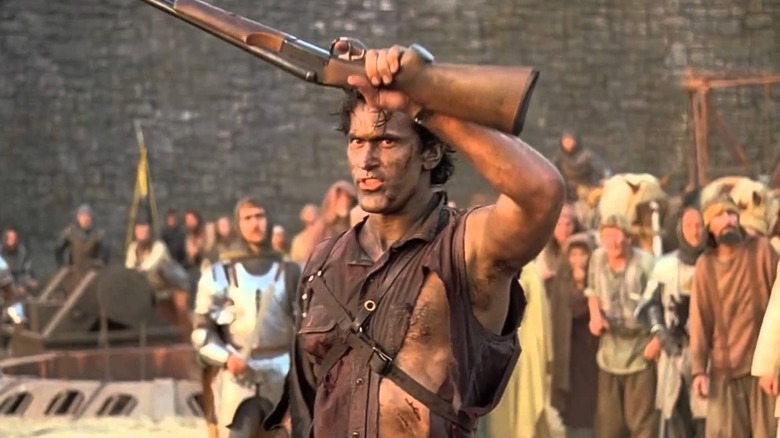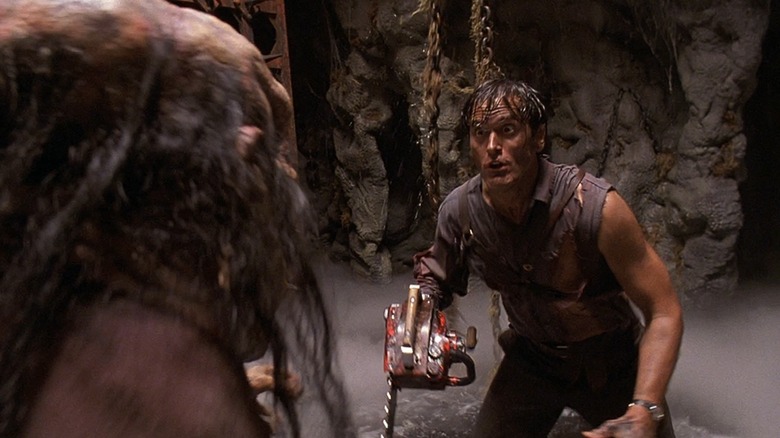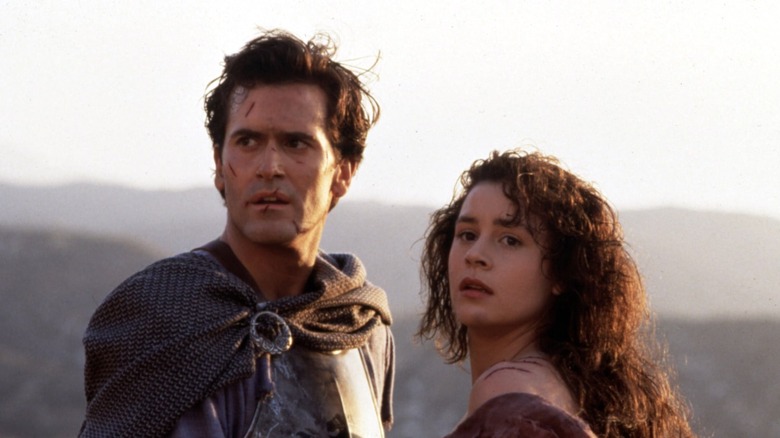The Alternate Army Of Darkness Ending Sam Raimi Wanted Us To See
Sometimes, a director's idea of the perfect ending isn't what the studio wants us to see. Just take Terry Gilliam's visionary dystopian sci-fi "Brazil." It ends on such a brilliantly downbeat note, but Universal was afraid it would bum everyone out too much and ordered a new happy conclusion, resulting in the infamous "love conquers all" cut. Thankfully Gilliam wasn't the kind of guy to take such tinkering lying down, and pushed the studio into releasing the film with his original sublime downer of an ending.
Universal was at it again with Sam Raimi's "Army of Darkness," the third film in the director's cult splatstick "Evil Dead" trilogy. Sent back to the Middle Ages at the end of "Evil Dead II: Dead by Dawn," our dim, square-jawed hero Ash (Bruce Campbell) finds himself captured by Lord Arthur and his men. After killing a Deadite he becomes a hero, and heads off to recover the Necronimicon, or Book of the Dead, which is his only way home.
Unfortunately, Ash screws up the incantation needed to collect the book safely, causing an army of the dead to rise and attack Arthur's castle. Enlisting the help of Lord Arthur's sworn enemy, Henry the Red, Ash helps the embattled humans defeat the Deadites and save his medieval sweetheart.
It's time for Ash to head back home — but this is the part of the plot where Sam Raimi and the studio differed on the best way to end the movie...
Sam Raimi's Original Ending For Army of Darkness
Having recovered the Necronimicon, a Wise Man tells Ash that he can return to his own time by taking six drops of a magic potion. After saying his goodbyes, Ash seals himself in a cave with his classic car to take care of business, but gets distracted and swallows too much. This causes him to overshoot his destination time. When he finally awakes, he stumbles out of the cave only to discover a futuristic, post-apocalyptic London. He then does a Charlton Heston thing, sinking to his knees and shouting, "No! I slept too long!"
Universal didn't like the ending, considering it too depressing, and ordered a reshoot. Some fans think it would have been a great way to set up Ash fighting against future Deadites in a sequel, and in a Q&A session during the promotional tour for "Ash vs Evil Dead." Raimi revealed that he had considered using this ending as a jumping off point for a sequel.
Raimi and his brother Ivan were working on a script for "Evil Dead 4" which followed on from both endings, with two different Ashes — present day Ash and post-apocalyptic future Ash. Ultimately, they felt the idea was too convoluted and decided to concentrated on Universal's "happy" ending instead, and the script eventually turned into "Ash vs Evil Dead."
What Happened in the Theatrical Ending?
In the less downbeat conclusion, Ash must take the potion and recite the same magic words he screwed up earlier in the movie. After kissing his medieval girlfriend goodbye, we dissolve to Ash working in a grocery store, relating his far-fetched tale to a couple of colleagues.
However, it turns out that he didn't exactly pronounce every syllable of the incantation correctly. The evil force returns and possesses a shopper, who attacks him and the customers. Ash springs into action and blows away the Deadite, uttering the immortal line, "Hail to the King, baby!" before passionately snogging an attractive co-worker.
Raimi's original ending might have matched the overall tone of the series better, but the reshot version gave Campbell another iconic quote and is more appropriate for the character Ash evolved into over the course of "Evil Dead II" and "Army of Darkness." It also perfectly sets the table for "Ash vs Evil Dead," which first graced our screens in 2015.
That new last line also took on a life of its own, featuring prominently in "Duke Nukem 3D" and providing the subtitle for the 2000 video game "Evil Dead: Hail to the King." Personally, I think it's a much better way to wrap up the film, as it is both snappier and funnier. While some purists might prefer Raimi's original ending, this might be one occasion when the studio was right to interfere with the director's vision...


